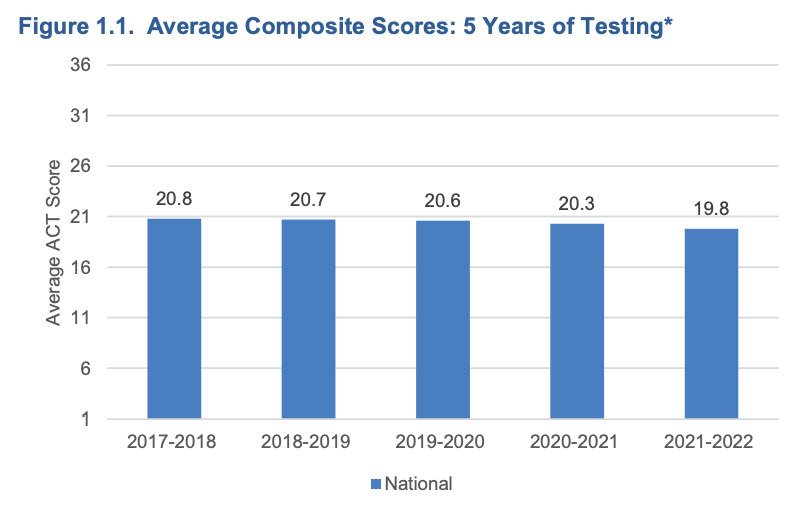ACT Scores Fall to Lowest Level In 30 Years
This story was produced by The 74, a non-profit, independent news organization focused on education in America.In yet another data point on missed learning during the pandemic, ACT scores from this year’s high school graduates dropped to their lowest level in three decades, according to a report released Wednesday.Exam-takers averaged 19.8 out of a possible 36 total points on the college admissions test, the first time since 1991 that nationwide results dipped below 20.“There is no way to sugar coat these ACT results,” Robin Lake, director of the Center on Reinventing Public Education, told The 74. “College entrance exam scores have plummeted, reflecting substantive holes in student knowledge and abilities.”Scores for students from low-income families were particularly worrisome. Those youth, who in many cases had to pick up part-time jobs during virtual learning or help out with child care, scored 17.4, on average. Only 8% hit college readiness benchmarks in all four subjects — math, reading, English and science — compared to nearly a quarter of their more affluent peers.Declines can’t be attributed solely to the pandemic, experts say, as ACT scores have been decreasing since 2018. But the pattern has accelerated since COVID hit.“The magnitude of the declines this year is particularly alarming, as we see rapidly growing numbers of seniors leaving high school without meeting the college-readiness benchmark in any of the subjects we measure,” ACT CEO Janet Godwin said in a press release.

The numbers provide new insight into the educational harms older learners experienced during the pandemic, said Thomas Dee, professor of education at Stanford University. In early September, the release of 9-year-olds’ reading and math scores via the National Assessment of Educational Progress revealed unprecedented declines in learning among younger students, but until now there’s been less documentation of the impacts for high schoolers, he said.“These latest [ACT] data should remind us to pay attention also to the experiences of recent graduates who spent most of their high school years under pandemic conditions,” Dee wrote in an email.Samantha Farrow, a senior at Stuyvesant High School in New York City, said the standardized tests she’s taken identified gaps in her learning from the pandemic — Algebra 2 especially, which she took when classes first went online in the spring of 2020. She sat for the SAT rather than the ACT, but said many of her friends took both exams and found them difficult.“There was still stuff in the SAT, like the Algebra 2 stuff, that I was just like, ‘I have no idea how to do it,’” she said. “I self-studied, too. I used Khan Academy, I did all that stuff. I just didn’t know how to do it. It’s just stuff that we missed.”

The college admissions testing landscape has changed in recent years. About one-third fewer high school grads took the ACT in 2022 than in 2018, as many institutions have become test-optional and an increasing share of young people choose to forgo higher education. Six states — Alabama, Louisiana, Mississippi, Nevada, Tennessee and Wyoming — administer the exam to all students.Amid widespread pandemic disruptions, which hit the most vulnerable students the hardest, declines in ACT results should hardly be unexpected, said Ronn Nozoe, CEO of the National Association of Secondary School Principals.“While these scores are alarming, they are certainly not surprising,” he wrote in an email. “School leaders and educators are doing everything they can. … We need our federal leaders to double down on supporting the academic and mental health needs of our students.”In fact, schools across the country received an unprecedented windfall from the U.S. government’s COVID relief spending, with a total of $190 billion meant to revamp schools’ infrastructure and help students recover from pandemic losses.“The trick now,” wrote Lake, of the Center on Reinventing Public Education, “is to face up to the enormity and urgency of the challenge while still recognizing that we do have the tools to act now to fix this.”


